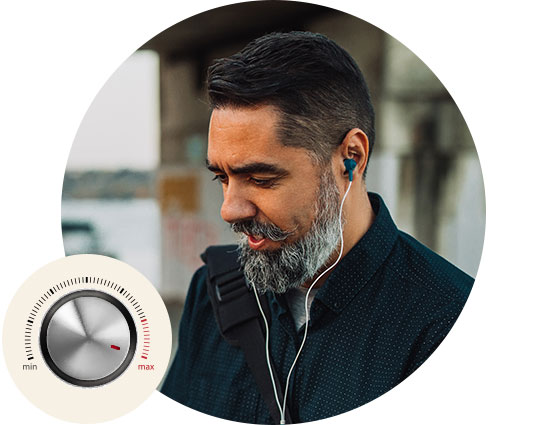Online Tinnitus Quiz
People with tinnitus often experience hearing loss too. Our quick online quiz can help you understand if you might have tinnitus and / or hearing loss and what you can do about it.

Tinnitus (ringing in the ears or head) can have different causes—hearing loss being one of them. Exposure to loud and/or excess sounds can damage the tiny hair cells in the inner ear, leading to hearing loss.
In fact, an estimated 90% of people with tinnitus have some degree of hearing loss.1
Common causes of tinnitus include:
1. Exposure to loud, sudden, or excessive noise
2. The natural aging process
3. Middle ear infections
4. Head, neck, and/or temporomandibular joint (TMJ) injuries or dysfunction
5. Reaction to medication
6. Other medical conditions such as Ménière's disease, otitis media (middle-ear infection), etc.


People with tinnitus often experience hearing loss too. Our quick online quiz can help you understand if you might have tinnitus and / or hearing loss and what you can do about it.
Your answers indicate that you may experience symptoms of tinnitus and hearing loss. We recommend that you visit one of our clinics. There are hearing aids that can treat your hearing loss and might give you relief from your tinnitus.*
* The result of the test may only be used for guidance. Official conclusions about hearing loss/tinnitus can be provided by our certified hearing care experts.
Your answers indicate that you may experience symptoms of hearing loss but no symptoms of tinnitus. We recommend that you visit one of our clinics to to see if you have a hearing loss that should be treated.*
* The result of the test may only be used for guidance. Official conclusions about hearing loss/tinnitus can be provided by our certified hearing care experts.
Your answers indicate that you may experience symptoms of tinnitus. We recommend that you read about tinnitus treatment options to learn about how to cope with and find relief from tinnitus symptoms.*
* The result of the test may only be used for guidance. Official conclusions about hearing loss/tinnitus can be provided by our certified hearing care experts.
Your answers indicate that you do not have tinnitus - or that you have non-bothersome tinnitus that is not currently affecting your everyday life. If you experience symptoms of tinnitus in the future, we recommend visiting your local health care provider.
* The result of the test may only be used for guidance. Official conclusions about hearing loss/tinnitus can be provided by our certified hearing care experts.
While it's unlikely that stress may be a direct cause of tinnitus, research shows that there could be a link.2
Some main causes of stress include bereavement, emotional or physical health changes, divorce, feeling under pressure, facing big changes in your life, and excess worry about something. The stress this puts on your mind and body may be related to tinnitus flare ups.
The presence of tinnitus can affect people in different ways and to different degrees, including increasing feelings of stress or anxiety. Some also find that it makes them irritated or depressed, while others aren't affected much or at all. Tinnitus may also make it difficult to fall sleep and stay asleep.

There are some medications that can affect your ears and your hearing health; these are referred to as being ototoxic.
Which medications can cause tinnitus?
Ototoxic drugs may temporarily intensify tinnitus symptoms, while some are thought to cause tinnitus and/or long-term hearing loss. There are more than 200 known ototoxic medications (prescription and over-the-counter) on the market today.3
Ototoxic drugs are often used to treat serious health issues where the benefits outweigh the risks of hearing loss or tinnitus. It's always a good idea to ask your doctor about the potential side effects when prescribed a new medication.

Studies have shown a link between COVID-19 and hearing loss, tinnitus, and dizziness due to the effect that the virus has on the nervous system and the auditory–vestibular system.4
Contact your doctor if you are unsure about your symptoms or are still experiencing symptoms four weeks after having had coronavirus.

If you experience sudden onset of hearing
loss or severe tinnitus, contact your doctor today.

The better you hear, the less your tinnitus may stand out.
Hearing aids amplify sounds around you, which helps redirect your attention away from the tinnitus sounds. Your brain can more easily focus on external sounds, making your tinnitus less noticeable.
Moreover, the latest hearing aid models have specially designed programs with built-in sound options that may help ease and soothe your tinnitus symptoms in an additional way.
1. https://hearinghealthfoundation.org/hearing-loss-tinnitus-statistics
2. Ciminelli, P., Machado, S., Palmeira, M., Carta, M. G., Beirith, S. C., Nigri, M. L., Mezzasalma, M. A., & Nardi, A. E. (2018). Tinnitus: The Sound of Stress?. Clinical practice and epidemiology in mental health : CP & EMH, 14, 264-269.
3. https://www.asha.org/public/hearing/Ototoxic-Medications/
4. Jafari, Z., Kolb, B., & Mohajerani, M. (2022). Hearing Loss, Tinnitus, and Dizziness in COVID-19: A Systematic Review and Meta-Analysis. Canadian Journal of Neurological Sciences, 49(2), 184-195.
5. https://www.nidcd.nih.gov/health/tinnitus#2
6. https://info.health.nz/conditions-treatments/ear-nose-throat/tinnitus#causes-of-tinnitus-3871
7. https://www.thelancet.com/journals/laneur/article/PIIS1474-4422(13)70160-1/abstract
8. https://hearinghealthfoundation.org/tinnitus-resources#tinnitus-causes